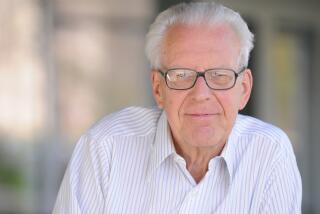Sir Fred Hoyle; Coined ‘Big Bang’
- Share via
Sir Fred Hoyle, the astrophysicist who coined the term “Big Bang” but never accepted that theory for the origin of the universe, has died. He was 86.
Hoyle died Monday in Bournemouth, England, his family said. The cause of death was not announced.
He became one of Britain’s best-known astronomers in 1950 with his broadcast lectures on “The Nature of the Universe.” He recalled using “Big Bang” for the first time in the last of those talks, but with derision to describe a theory on the origin of the universe that he didn’t accept.
Hoyle believed the universe came from a continuing pattern of development having no beginning and no end. But over the years this view was shared by fewer and fewer scientists as the Big Bang theory gained greater acceptance.
However, Hoyle continued to robustly defend his view, and last year published “A Different Approach to Cosmology,” co-authored by Geoffrey Burbidge, a UC San Diego astrophysicist, and Jayant V. Narlikar.
Working with Hermann Bondi and Thomas Gold, Hoyle proposed the steady-state theory in the 1940s. “Every cluster of galaxies, every star, every atom had a beginning, but the universe itself did not,” Hoyle said.
In Hoyle’s view, stars were created by condensation, and their growth and development are fueled by the capture of further interstellar material until galaxies or clusters of galaxies combine.
Hoyle believed that as new matter forms, the universe expands without end because it is infinite in space and time and the galaxies tend to space themselves more widely apart. As they do so, new galaxies form at such a rate that their average density in space remains unchanged with time. Although the individual clusters evolved, the universe does not.
In the 1950s, observations by radio astronomy demonstrated that the universe was expanding faster than Hoyle’s theory predicted, giving credence to the view that the universe began in an explosion of incredibly dense matter--the theory Hoyle called the Big Bang.
“He coined that phrase in fact as a denigration for the conventional wisdom,” said Hoyle’s associate, professor Chandra Wickramasinghe of University College, Wales.
“And it was his belief, and it is also my belief, that the standard Big Bang theory, which says that everything began at a definite moment in time and that there was nothing before that, this has to be essentially wrong, and that the universe has an infinite age and an infinite extent in space,” Wickramasinghe said Wednesday on British Broadcasting Corp. radio.
Hoyle’s best work may have come later in the 1950s when he teamed with Fulbright scholar William Fowler and Geoffrey and Margaret Burbidge to demonstrate that chemical elements heavier than helium were the product of nuclear reactions inside stars. The theory of nucleosynthesis was described in “Synthesis of the Elements in Stars” in 1957.
With Wickramasinghe, Hoyle promoted the theory that life--and some diseases, including AIDS--reached Earth from space. Their publications included “Diseases From Space” (1979) and “Space Travelers: The Origins of Life” (1980).
Hoyle also was a staff member of the Mt. Wilson and Palomar observatories from 1957 to 1962, visiting professor at Caltech in 1953 and 1954, and professor of astronomy at Cornell University from 1972 to 1978.
Hoyle was born in Bingley, Yorkshire. His father sold textiles and the family was not well off. As a child, Hoyle skipped school often and amused himself reading chemistry texts at home. He moved into the experiment phase, making gunpowder and setting off blasts. He eventually won a scholarship to a local private school,and that led to Cambridge, from which he graduated in 1939.
During World War II, he led a group that developed radar for the British Admiralty. Bondi and Gold, who later worked with Hoyle on the steady-state theory, were also on that team.
Hoyle played a key role in establishing the Institute of Theoretical Astronomy at Cambridge and, beginning in 1958, was the institute’s first director. He held that post until 1972 when he resigned in a dispute with other academics on the future of the institute’s development.
For his part, Hoyle was not much concerned that his theories were less well received over the years, noting in a 1994 interview with the Times of London:
“What people tend to say about my work is that for the last 15 years, it has been all wrong, while previously it was about 80% right,” he said. “What I think is that one’s score doesn’t really change.”
A prolific writer of scientific papers and books, Hoyle also wrote science fiction, including “The Black Cloud” (1957), about an intelligent cloud around the sun that caused an ice age, and “A for Andromeda” (1962), about aliens instructing humans on building a destructive machine. Several of the books were co-authored by his son, Geoffrey.
In addition to his son, Hoyle is survived by his wife of 61 years, Barbara Clark, and a daughter, Elizabeth Jeanne Butler.




